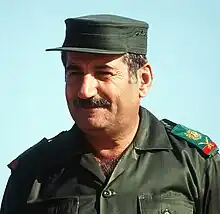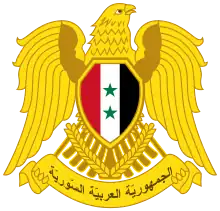Ali Habib Mahmud | |
|---|---|
علي حبيب محمود | |
 Mahmud in 1990 | |
| 10th Minister of Defense | |
| In office 3 June 2009 – 8 August 2011 | |
| President | Bashar al-Assad |
| Prime Minister | Mohammad Najji Outri Adel Safar |
| Preceded by | Hasan Turkmani |
| Succeeded by | Dawoud Rajiha |
| 19th Chief of Staff of the Syrian Army | |
| In office 12 May 2004 – 3 June 2009 | |
| President | Bashar al-Assad |
| Preceded by | Hasan Turkmani |
| Succeeded by | Dawoud Rajiha |
| Personal details | |
| Born | 1 January 1939 Tartus, First Syrian Republic |
| Died | 20 March 2020 (aged 81) Damascus, Syria |
| Political party | Syrian Regional Branch of the Arab Socialist Ba'ath Party |
| Military service | |
| Allegiance | Syrian Army |
| Years of service | 1959–2011 |
| Rank | |
| Commands | 7th Mechanized Division |
| Battles/wars | Yom Kippur War Lebanese Civil War 1982 Lebanon War Gulf War |
Ali Habib Mahmud (Arabic: علي حبيب محمود; 1 January 1939 – 20 March 2020) was a Syrian military officer who served as Syria's minister of defense from June 2009 to August 2011. As one of Syria's most celebrated generals,[1] he was part of President Bashar al-Assad's inner circle.[2]
Early life and education
Mahmud was born into an Alawite family on 1 January 1939 in Tartus[3][4] and joined the army in 1959.[5] In 1962, he graduated from the military academy.[3]
Career
Mahmud fought in Yom Kippur War against Israel. He also led forces against Israeli troops invading Lebanon in 1982, including the Battle of Sultan Yacoub. He commanded 7th mechanized infantry in 1985.[4] In 1986, Mahmud became a general.[6] He also participated in the Gulf War as part of the international coalition that liberated Kuwait from Saddam Hussein's Iraq in 1991.[2] In 1994, he was appointed commander of the special forces.[5] In 1998, he was promoted to the rank of major general.[6] He was appointed deputy chief of staff in 2002. On 12 May 2004, he was appointed chief of general staff of the Syrian army and the armed forces.[3][7] He replaced Hasan Turkmani, who was appointed defense minister.[7] In addition, Mahmud was a member of the Baath Party.[6]
On 3 June 2009, President Bashar Assad appointed Mahmud as defense minister, replacing again Hasan Turkmani.[3][8] Mahmud's term ended on 8 August 2011, and he was replaced by Dawoud Rajha in the post.[5]
On 4 September 2013, the opposition wrongly claimed that Mahmud had defected and escaped to Turkey.[9] In fact, he remained in Syria.[1]
Sanctions
In May 2011, the United States accused Habib of human rights abuses, and announced a travel ban and asset freeze.[2]
Death
On 20 March 2020, Mahmud died in Al Assad University Hospital, Damascus.[10]
References
- 1 2 Kamal Alam (23 January 2019). "Kissinger's Prophecy Fulfilled in Syria". War on the Rocks. Retrieved 2 February 2019.
- 1 2 3 "Bashar al-Assad's inner circle". BBC News. 18 May 2011.
- 1 2 3 4 وزير جديد للدفاع في سورية (in Arabic). BBC Arabic. 3 June 2009. Retrieved 15 December 2010.
- 1 2 Hanna Batatu (1999). Syria's Peasantry, the Descendants of Its Lesser Rural Notables, and Their Politics. Princeton University Press. p. 228. ISBN 978-0-691-00254-5.
- 1 2 3 "Ex-Syrian DefMin Opposition to Hama crackdown led to firing – Sources". Asharq Alawsat. Damascus, London. 9 August 2011. Archived from the original on 3 July 2013. Retrieved 5 April 2013.
- 1 2 3 "Who is Defence Minister Ali Habib Mahmoud?". Gulf News. 17 June 2011. Archived from the original on 9 October 2017. Retrieved 8 March 2013.
- 1 2 Flynt Lawrence Leverett (1 January 2005). Inheriting Syria: Bashar's Trial by Fire. Brookings Institution Press. p. 190. ISBN 978-0-8157-5206-6. Retrieved 12 March 2013.
- ↑ "Syria names former army chief new defence minister". Syria Today. July 2009. Archived from the original on 30 November 2010. Retrieved 15 December 2010.
- ↑ Exclusive: Former Syria defense minister defects in break with Assad. Reuters. Retrieved on 2013-09-06.
- ↑ "Former Syrian army chief Ali Habib dies aged 81". alaraby.co.uk. 20 March 2020.
